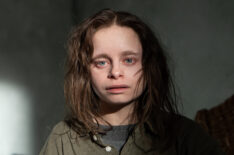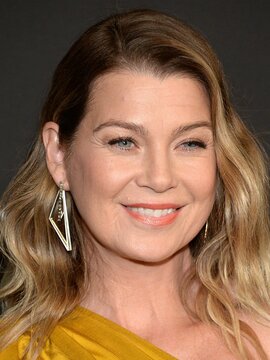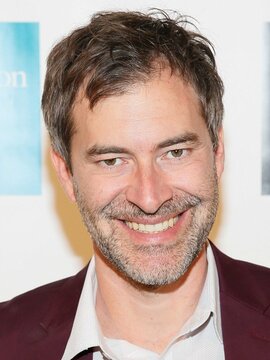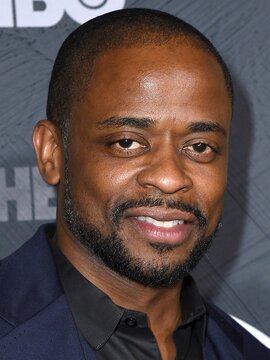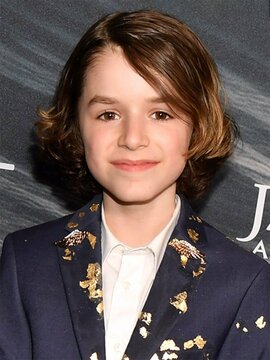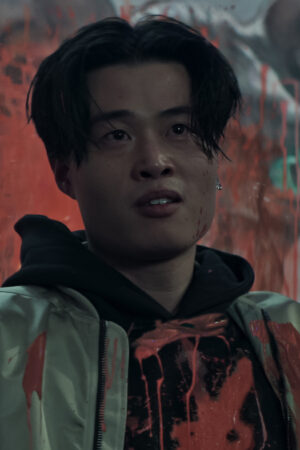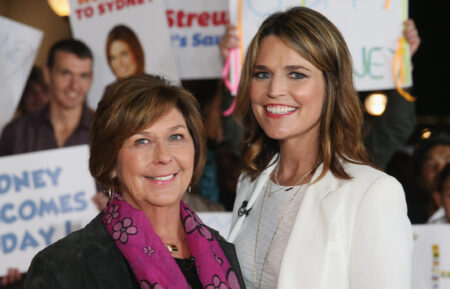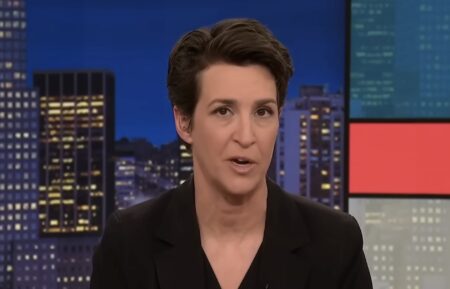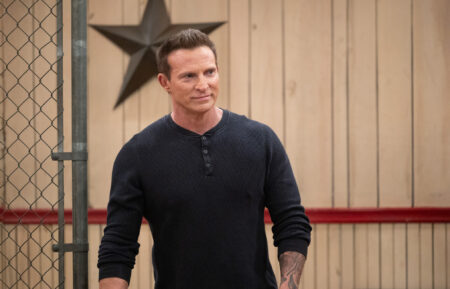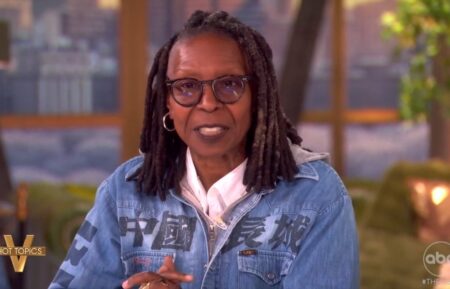‘Good American Family’: Mark Duplass on Michael’s Meltdown & Victimhood as Natalia Grace Truth Comes Through
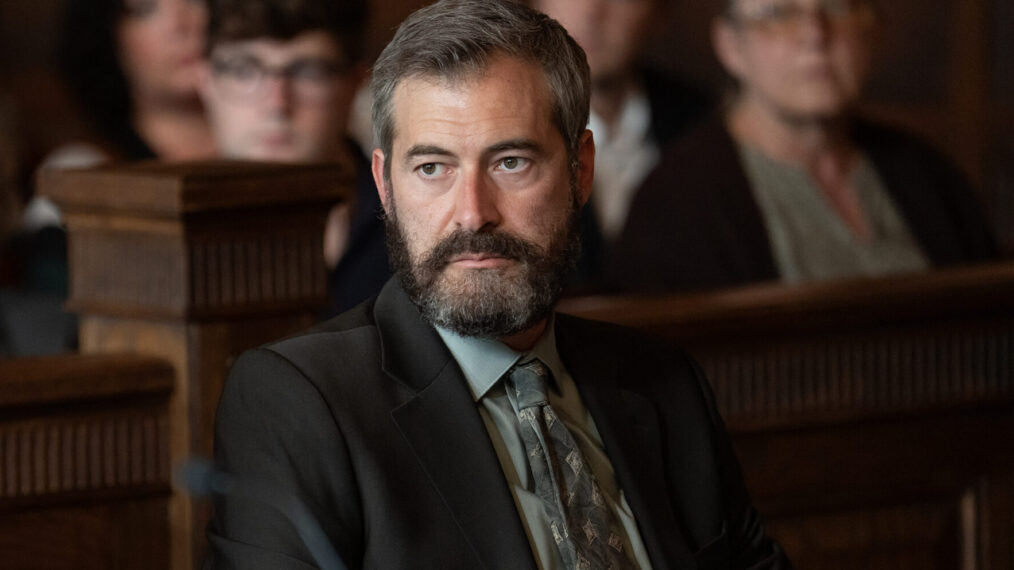
Spoiler Alert
[Warning: The following post contains MAJOR spoilers for Good American Family‘s finale, “Blood on Her Hands.”]
Natalia Grace (Imogen Faith Reid) finally gets her day in court against the Barnetts in the finale of Good American Family, but it does not go anywhere near to plan. The attorneys for Kristine (Ellen Pompeo) and Michael (Mark Duplass) successfully avoid having Natalia’s age re-litigated at trial thanks to a past procedural error on the part of the state. So, despite the prosecution boasting a slew of witnesses who are ready and willing to attest to Natalia’s childhood — and the fact that the Barnetts knew of it when they abandoned and abused her — no one is allowed to speak to it. Michael is found not guilty, and the legal system has once again failed Natalia Grace.
Before his exoneration, Michael does have a moment of reckoning in which he seems to realize what he’s done. Though Kristine talks him down from it, there’s a moment when he finally starts to understand that he’s been an active participant in harming a child with disabilities who he was supposed to protect, and he immediately begins to experience a panic attack. In the end, though, when confronted face-to-face by Natalia, he resorts to victimhood and blame-gaming once again.
Throughout the second half of Good American Family, Michael is given several chances to make things right with Natalia and declines to do so every time. The finale is no exception.
So why is it that he’s still so under Kristine’s control? And what was it like to portray a character who’s constantly avoiding the truth about his own life and actions? TV Insider caught up with Mark Duplass to lift the veil a bit more on Michael’s perspective throughout the events of Good American Family.
Coming into this show, did you have any preconceived notions about this story? And if so, did the scripting and the story change anything for you?
Mark Duplass: Yeah, I mean, I was a good target for this show because I had read headlines but not in-depth articles. I had not seen the documentary. I had probably made some biased snap judgments about what was going on without doing any in-depth reading, so I was right in the sweet spot. And when Katie [Robbins] and Sarah [Sutherland, co-creators,] approached me about this, I was a little skeptical ’cause I just don’t know how I feel about ripped-from-the-headlines things. And they said, “No, this is something we want to do. I know there’s a doc out there. I know that we’ve seen this play out in the media, but we feel like people have made a lot of snap judgments here, and we would like to sort of implicate the audience and take them along the road in which the media took them along and then shift them halfway through the show in this multi-perspective approach.” And I found that to be really bold and interesting for a very expensive, high-profile miniseries starring ABC and Hulu’s golden goddess, Ellen Pompeo, that they would let them do this kind of thing. So, that got me interested.
So I did a little bit more research on the story and realized how complex it would be, and I think the thing that ultimately hooked me was just the character of Michael. I watched a little bit of the documentary — not enough to judge, just enough to get a sense of his rhythms and whatnot, because he is a public figure, and you have to know what you’re playing, even though it’s really just kind of a character inspired by. And when I saw this sort of road map for me of someone who’s dealt with lifelong mental health issues, someone who’s got some childhood trauma, someone who has a savior complex because they feel like they barely survived, and they see someone else suffering, they have to go and try and help them and save them, so they don’t have to look inward, all of those things felt like, “I can see this.” I definitely have a lot of experience with mental health, and so that was an easy road map for me. And I just wanted to do my best to portray somebody who has highly questionable motivations and behavior in a way that didn’t have any judgment to it.
Were there any physical characteristics, mannerisms, or dialogue traits that you did try to bring in of the real-life Michael?
The only thing I tried to carry forward was just a sense of… a little bit of hyperbole and histrionics in the mannerisms, which for me are indicative of someone living in a place of fear and a sense that no one will believe you, so you have to be a little bit more demonstrative — also very much indicative of anxiety. So that felt like something that worked with the way I wanted to play the character, but, at the same time, when you’re playing those kinds of things, they can quickly just look like bad overacting, right? So you have to find the fine line between what is reasonable behavior and then just looks like acting 101. But beyond that… I was encouraged to make my interpretation of the character.

Disney / Ser Baffo
Some of the other actors that you play opposite obviously have to pull double duty if not more, with Imogen and Ellen especially. Can you talk about trying to maintain your characteristics amid these crazy shifts in the personalities of your scene partners?
Michael, I think, undergoes the most subtle shifts in the character perspective in the series, because I think that a lot of the atrocities that Michael commits are atrocities of passivity and enabling, so they don’t look quite as different — although there are certain things that are quite different. Honestly to me, they didn’t feel at odds with each other, seeing the different versions of Kristine or the different versions of Natalia. I don’t know, it’s just my perspective as someone who’s been through a lot of therapy, and I’m an independent film producer, and I see people at their worst and at their best, and I’m just like, “Hey, this is all reasonable behavior that one might see from a particularly unemotionally-evolved and scared group of people,” for whatever reason. So I really enjoyed seeing those disparities and those differences and just taking them in the moment and playing with them and not trying to get overly intellectual about how they all dovetail with each other.
There is a moment where Michael’s personality shifts so much. That’s when he appears in Episode 5 and then again in 7 — the apartment visit and then the courtroom testimony — and there’s such a casual cruelty that he has. Can you talk about adopting that for those scenes?
Yeah, I think “casual cruelty” is a really good description. I think that a character like Michael is so desperately afraid to go off of the rails — and this is something I can identify with as somebody who’s dealt with my fair share of mental health issues — when you’ve got things roughly together, you don’t want anything to change it, and you’re terrified to look into the darker corners of yourself and in situations of your life for fear that they might spin you out. So when it comes time for the elliptically disastrous moments to deal with — rejecting someone in a courtroom, leaving your potential adopted daughter in this apartment, having to film her for maybe some legal proof of what you need to exonerate yourself — I found it a very reasonable decision that he would be at his most robot-like, removed, and zombie-like in order to not look anywhere close to that. And I think I wouldn’t be surprised if someone like that took quite a few anti-anxiety pills in order to get through those moments, which, when you see that look, it can be particularly disheartening and frightening to see a lack of emotion in a situation that is so inherently emotional, but I’ve seen that.
The finale is when he really entertains the idea of what he’s done — that they’ve really abused this child. Can you talk about just giving into that moment, and then how his willful obtuseness kind of comes back in with Kristine?
I think you’ve got great phrases. “Willful obtuseness” is also really, really spot-on in my opinion. And what is willful denial, right? Is it something that you’re absolutely aware of and you choose? Or is it something that you’re so terrified that you’re actually not even willing to look at it, so you’re not even quite sure what you’re doing and you’re rationalizing some other choice in your brain? I think Michael might be a little bit more of the latter in the way that I played him, and I think that it takes quite a long time for Michael to open his mind up to the possibility that he may have been a large part of enabling this kind of behavior.
I think what I found so fascinating about the second half of the show is that, if you look at the rhythms of episodic storytelling, all the signs are pointing towards the character of Michael Barnett being the person to have a big change of heart, being able to upend the big villain and have their moment and have their huge apology and their emotional reckoning, and you don’t get it in this story. I think, at best, you get an incredibly unemotionally-aware broken man, just seeing the first pinprick of light that he may have destroyed another human being, particularly someone who is dependent on him to take care of them. So the end of the show is really the beginning of Michael’s emotionally aware journey, and I think a quite horrifying road for him to reckon with what he might have done.
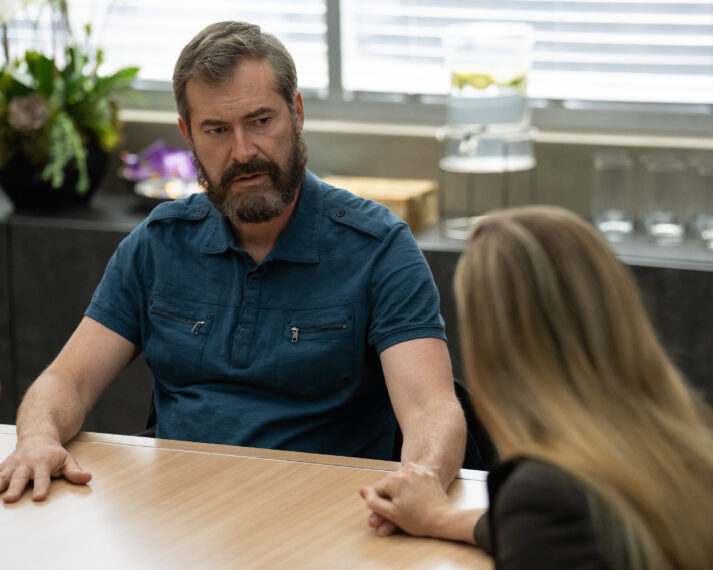
Disney / Ser Baffo
Yeah, and it seems like the defense mechanism that he turns to at that point is to kind of play victim a little bit. Can you talk about playing to that, especially in the finale when Natalia comes to him and is like, “Just admit what you did,” and his go-to is “Oh, Kristine was the one…”?
Yes. You know, Ellen said something quite brilliant that I had never really thought of before… “Villains often turn to victimizing right away when they’re criticized,” and I think we’ve all had that conversation with a friend or a loved one where you try and make them aware of a wrongdoing, and their first response is, “Oh, so now I’m the a**hole.” That’s what Michael’s whole journey is here, the “Oh, so now, I’m the a**hole” journey. And I think that it’s a little bit more nuanced in the case of Michael, or at least the way that I chose to view it and portray it, is that it’s not just a puerile surface-level symptom of someone who can’t accept blame. It’s a much more deeply-rooted trauma of someone who is highly depressed, has no self-esteem, is in fear of their own suicidality, and if he actually is forced to look at that, he may not survive it. So it’s a true survival mechanism for a character like Michael, which again, I can understand, and it was a really interesting thing to play — certainly not fun to have to deal with as Natalia’s trying to gain some sort of closure, it’s dark.
There are a couple of moments where he does fight back against Kristine, though. For example, in the green room before the interview, and then in the car when he gets the text message. Why is it that he can’t stick with that? Even when he gets a new wife, he lets Kristine bully her out of the room.
Right. Look, I think that there are a number of reasons, and I’m certainly not a psychologist, but if you look at people who are bullied, even schoolyard kids who are bullied go lift weights, go confront their bully, they’re three times the size of them, and they still get beat up because they are just psychologically under the thumb. So I think Michael has moments where he spikes through, but we’re talking about years of abuse at the hands of Kristine, and I think that what you’re dealing with is someone who believes that Kristine saved his life, so that he not only owes her that, but I think deep down believes that he’s not sure that he can survive without her love. So once he’s out of that thumb and he gets himself into a new marriage, that gives him one little footstool, in order to up the bravery to challenge her a little bit, but it’s cyclical, right? This was exciting to me ’cause it’s much less like a movie structure where, in a movie, once you confront the abuser once, it’s all done. This is a sine cosine wave, which feels much more like life, and that’s part of the fun of having eight hours to tell a story.
Absolutely. Looking back, what were some of the most emotionally challenging scenes for you to do?
The scene where I come to see Natalia in Episode 5 in her apartment was the hardest for sure, and Imogen and I knew it was coming. We prepared for it. We have a lot of affection for each other, and I feel very protective of her. This is her first big job on a set, and she’s just such a wonderful person. And so I loved being able to have those fun playful scenes with her, and then to have to turn around and do that, and the scene was brutal, and we would cry after takes, [share] a hug, and get back up for it. So yeah, that was a hard one.
On the opposite end, what was the most rewarding scene to see that you weren’t in?
I really liked watching Episode 6 because I wasn’t even around for it. My good friend Hannah Fidell directed it. I produced one of her early independent films, and I was so excited she was coming to direct. And I was like, “I’m not even in that episode, s**t.” But the way my life works is, for better or for worse, I get that script. I read it, I put it away. I’m busy producing all this other stuff. And then I was like, “Oh my God, there’s this whole episode of TV that I kind of forgot about,” and watching Imogen sort of squarely lead that … As a new performer, this is her first speaking role, I just felt like immensely proud of her. It’s really the feeling I had.
Was the music choice kind of a reference to your indie rock career a little bit? Was that an Easter egg?
No, it was already in there, so they didn’t build that for me, but I was so happy when they said you’re going to be singing “Hey Soul Sister” in the car because that was popular with my kids when they were little, and I personally have this extremely obnoxious and off-putting quality where I sing harmonies to songs that don’t exist. I just add harmonies in there, so I asked their permission if I could throw in an extra non-existent harmony, and you can hear it right at the end of the song there.
Lastly, some things have changed, past the point where this show actually concludes, especially with Michael and Natalia and what they contributed to the final chapter of Curious Case, and then with the news about the Mans family. Is there any part of you that hopes this will pick back up for a second round and kind of investigate some of that new material?
What I really want is for the world to recognize the talent of Imogen and for her to get the juggernaut career that she deserves. So whether that takes place in Season 2 where she gets to explore Natalia further, or whether that means [Martin] Scorsese and [Steven] Spielberg come calling with something else, I will take either of those things. That would be lovely.
Do you want to work with her again on something soon?
I would love to. We’re constantly texting and whatnot, so yes, I would love to.
Good American Family, Streaming Now, Hulu

